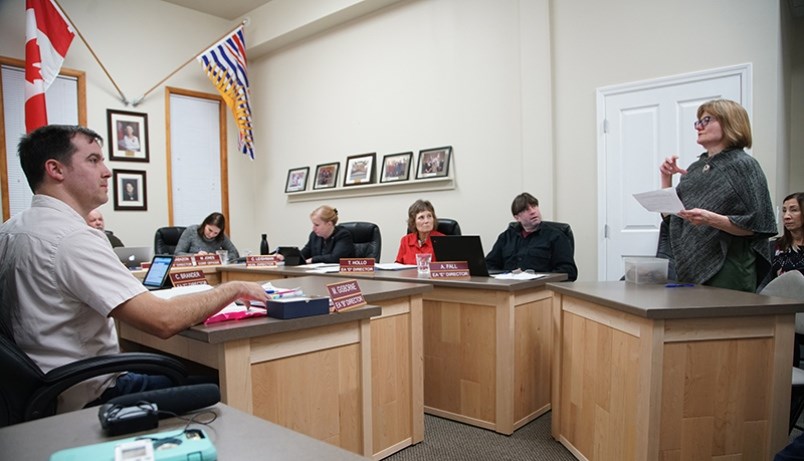qathet Regional District board has offered a formal apology to Kim Barton-Bridges for conduct that occurred at the November 28, board meeting.
At the regional board meeting on Wednesday, December 18, directors considered three motions arising from the November board meeting, where Barton-Bridges appeared as a delegation concerning a water study the board was considering and has since approved, pertaining to the prospect of connecting Electoral Area B residents with municipal water, from the city limits to Centennial Drive. Barton-Bridges requested a formal apology after the November 28 board meeting.
The first motion read that the board offer the opportunity to [Electoral Area B] director Mark Gisborne to apologize for comments he made to Barton-Bridges at the meeting.
Gisborne proposed an amendment to the motion, replacing “comments he made” to “questions that he asked.” There was no seconder.
He said the reason why he put forward the amendment was in reviewing the transcript of the meeting, the issue Barton-Bridges has appears to be with the question he asked regarding her qualifications to comment on the water study.
“That appears where Mrs. Barton-Bridges has taken offence,” said Gisborne. He said he had prepared a formal written apology, which he handed out to the board.
Gisborne said at the November board meeting, chair Patrick Brabazon did not allow him to give an explanation of his thoughts to the delegate. He said he thought it was unfair he was not allowed to explain what is going on to his residents when they appear as a delegation. Instead, he was allowed to ask a question.
Gisborne said looking back, he can see how someone might interpret the question as being offensive. He said for that, he apologizes and put forward the written statement.
“The apology is put forward by me, personally,” said Gisborne. “Some residents contacted me and insisted that I should not have to apologize for asking that question, but this decision is mine to make.
“I want to improve the relationship. I want to bridge the gap that exists. I put forward the written apology in the hope that Kim Barton-Bridges accepts it and is willing to consider communicating and working with me at some point in the future.”
The motion for Gisborne’s apology carried.
The second motion was that the board issue a formal apology to Barton-Bridges for the conduct that occurred at the same meeting.
The motion carried.
The board then considered a third motion which read: that the board, in response to public concern and a respectful workplace, direct staff to prepare a full and complete report regarding the conduct of director Gisborne in consultation with legal counsel, including sanction options and proposed language for resolution of censure, if necessary.
Area E director Andrew Fall said some directors may feel the apology is not enough and that certain steps need to be taken, hence the third motion. He said he has searched for censure in regional districts and found instances in two.
Fall said to properly deliberate on a censure motion regarding abusive conduct, and to ensure the public understands the basis for such a motion, he believes a clear standard is required.
“As such, I believe we have a duty to prioritize development of a code of conduct, in 2020, ideally, to provide a transparent benchmark to distinguish acceptable from unacceptable conduct.”
He said many regional districts have a code of conduct policy and that he would be happy to help develop one for qathet Regional District.
Brabazon said he agreed.
“We badly need a proper code of conduct and 2020 should be the year we come up with it,” he said.
Area D director Sandy McCormick said the motion was about getting information. She added that it was appropriate for the regional district to have a code of conduct.
“I agree we should be getting information to know what the possibilities are without any intent of taking action other than getting the information,” said McCormick.
City director George Doubt said he was in favour of the motion and having staff prepare a report on Gisborne’s conduct at the previous regional board meeting.
“The public needs to be able to be confident they can come here and express their opinions and be listened to respectfully by the board,” said Doubt. “I don’t think that happened that night and we should have a report from staff on options to deal with that, and moving forward, with how to deal with situations that may arise in the future.”
Doubt also agreed with the need to create a code of conduct.
Gisborne said that as has been pointed out, there is no code of conduct for elected officials and he agrees one is desperately needed. He added that the issue he had with the motion stems from Robert’s Rules of Order. He said the rules stipulate a motion should not reflect on a member’s conduct or character, but a motion to censure would be the exception to this rule. The motion before the board was not a motion to censure, which means the motion before the board was an improper motion, he added.
Gisborne said singling out a board member could lead to a legal problem. He said staff should determine whether the board has the legal authority to censure any director, especially where there is no code of conduct.
Gisborne said the motion was almost setting up the regional board to be a court and the whole board should be worried about the legal ramifications of such an action.
The board carried the motion with Gisborne and Fall opposed.



